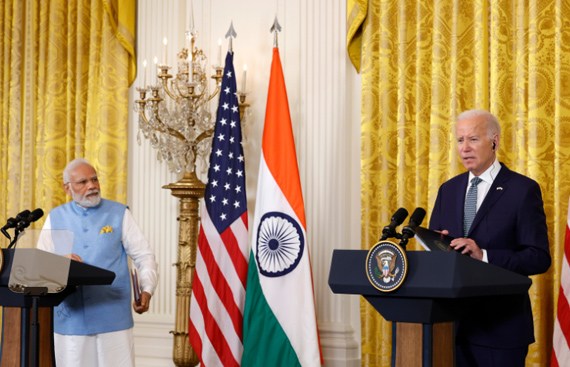U.S.-India Technology Cooperation: A Strategic Partnership for the Future

The U.S.-India tech cooperation holds immense promise, driven by innovation, global influence, and the potential to address global issues collaboratively for a brighter technological future.
The recent months have seen the establishment of the U.S.-India Initiative on Critical and Emerging Technologies (ICET). Technology-related matters have played a significant role within the Quad, leading to the recent release of principles concerning crucial technology supply chains. Additionally, there has been a strong emphasis on utilizing technology policies and trade to propel economic growth within the Indo-Pacific Economic Framework (IPEF).
This online event signalled the start of a fresh collaboration between the Wilson Center and NASSCOM. Their collaborative endeavor explores potential challenges and opportunities for enhancing technological cooperation between the United States and India. During the event, they discussed important issues, devised ways to collaborate in technology, and addressed any problems. Furthermore, at the event, they introduced a new form of discussion called "Track 1.5" to delve deeper into these subjects.
Current State of U.S.-India Technology Cooperation
The US and India have a history of technology cooperation dating back several decades, but a deepening and diversification of this relationship mark the present scenario. The cooperation spans various sectors, including information technology, pharmaceuticals, and clean energy.
Information Technology
The information technology sector has been a flagship area of cooperation between the US and India. Indian IT firms have a significant presence in the US, providing services to numerous American companies. This collaboration has contributed to the economic growth of both nations and fostered innovation and job creation.
Pharmaceutical Industry
The pharmaceutical sector is another field where U.S.-India cooperation is crucial. India is often called the pharmacy of the world due to its massive generic drug production. This has led to affordable healthcare worldwide and has aided in tackling global health crises, such as the distribution of generic drugs during the COVID-19 pandemic. Furthermore, both nations have partnered to facilitate research and development in the biotechnology and pharmaceutical sectors.
Clean Energy and Climate Change
Climate change is a global concern, and the U.S. and India are keen to address it collaboratively. India's ambitious renewable energy targets align with U.S. efforts to combat climate change. The two nations have joined forces to promote clean energy technologies, improve energy efficiency, and invest in sustainable development. Their cooperation in this domain can lead to significant strides in addressing environmental challenges while fostering economic growth.
Space and Aerospace
India has made notable advancements in space exploitation through its Indian Space Research Organisation (ISRO). The US-Indis cooperation in space technology and aerospace has opened joint missions and satellite launch opportunities.
Education and Research
The U.S. is home to some of the world's most prestigious educational and research institutions, making it a prime destination for Indian students and researchers. Collaboration in higher education, research, and innovation has strengthened ties between the two countries. Indian students studying in the U.S. contribute significantly to the U.S. economy and technology sector while gaining valuable skills and knowledge.
The present and future of U.S.-India technology cooperation is a story of promise, innovation, and global impact. With both nations being at the forefront of technological advancements, their partnership has the potential to drive progress and address global challenges. The U.S. and India must nurture this relationship, address challenges, and work collaboratively to create a future where technology serves as a force for good, benefiting their citizens and the world.


.jpg)
.jpg)